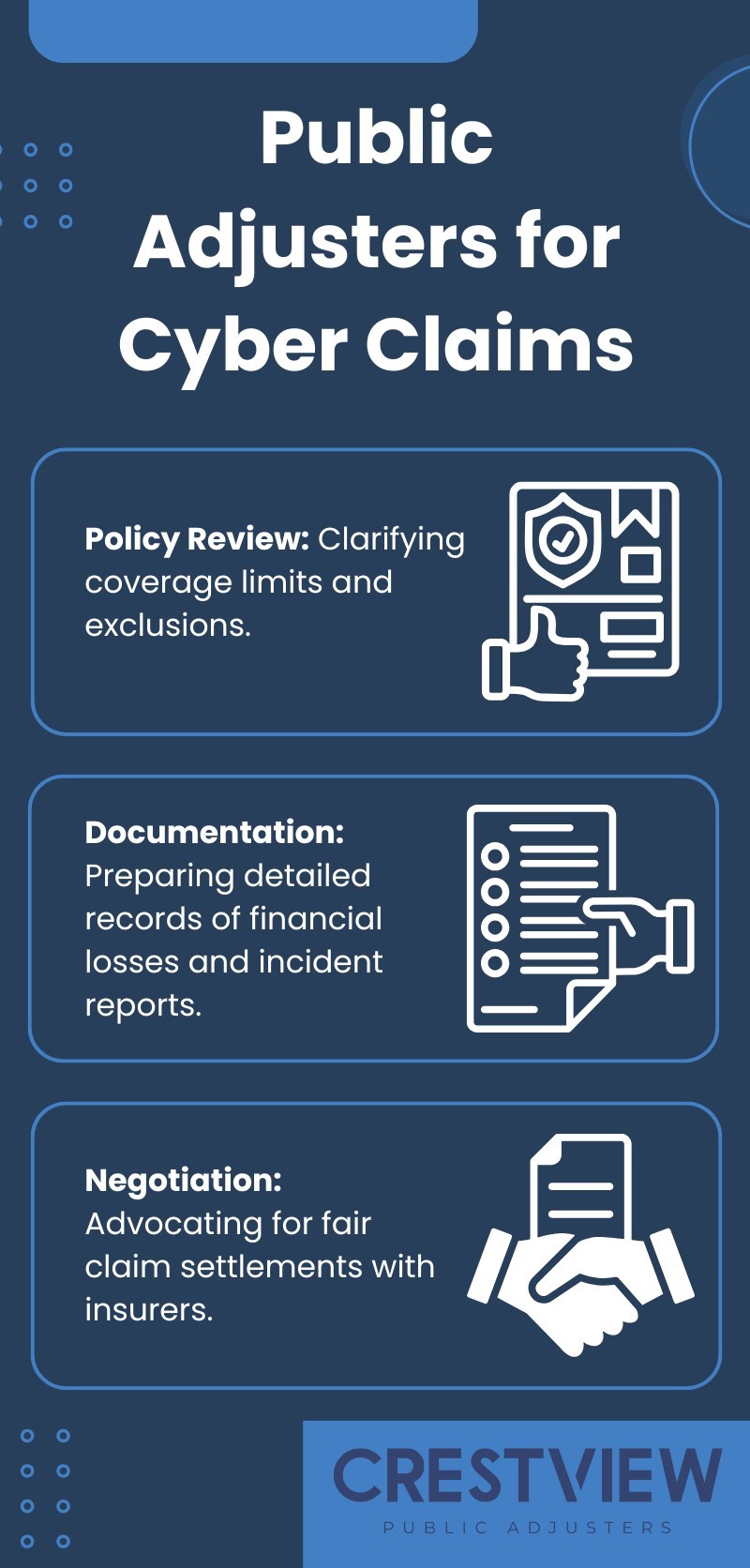Key Points:
- Cyber insurance protects businesses from financial losses caused by cyber incidents, such as data breaches and ransomware attacks.
- Common claims include expenses for data recovery, regulatory fines, and legal defense costs.
- Public adjusters, like Crestview in New York, assist policyholders in maximizing their claims for cyber incidents.
Cyber insurance helps businesses recover from cyberattacks. Claims can arise from ransomware attacks, which may cover paying the ransom and restoring encrypted data. Data breaches often lead to claims for notification costs and credit monitoring. Business interruptions caused by cyber incidents may also result in claims for financial losses.
Legal expenses and regulatory fines may be covered if data protection laws are violated. Phishing scams that lead to financial theft can prompt claims as well. Cyber insurance helps handle the costs of recovery after an attack. It is essential for businesses to protect themselves from increasing cyber threats.
Understanding Cyber Insurance Claim Examples
Cyber insurance provides a safety net, but understanding real-world claim scenarios can make policyholders better equipped to handle potential threats. Below, we’ll explore cyber insurance claim examples and how they help safeguard businesses financially.
What Are Cyber Insurance Claim Examples?
Cyber insurance claim examples highlight the types of financial losses covered by cyber insurance policies after a cyberattack or data breach. These examples typically involve claims for ransom payments, forensic investigations, third-party liability, and system restoration costs.
Cyber claims often arise from incidents like ransomware attacks, phishing schemes, and insider threats. Knowing how these claims are processed helps policyholders anticipate challenges and secure their businesses against escalating cyber risks.
3 Common Types of Cyber Insurance Claims
1. Ransomware Attack Costs
Ransomware claims have skyrocketed in recent years. Attackers encrypt critical systems and demand payment to release them. For example, a healthcare provider faced a $500,000 ransom demand after hackers infiltrated patient records. The insurer covered:
- Ransom payment negotiation and payment.
- Costs for forensic experts to investigate the breach.
- Data restoration efforts to resume operations.
This claim underscores the importance of having a comprehensive policy that includes ransom negotiation services and system recovery coverage.
2. Data Breach Response Costs
Data breaches often lead to substantial financial losses, especially when customer data is compromised. Consider an e-commerce company where hackers stole thousands of customer credit card details. The insurance covered:
- Notification costs to alert affected customers.
- Credit monitoring services to protect those impacted.
- Legal fees incurred due to regulatory investigations.
Such claims demonstrate how cyber insurance helps businesses mitigate reputational damage and regulatory penalties.
3. Business Interruption Losses
Cyberattacks often disrupt operations, leading to significant revenue losses. For instance, a manufacturing company’s production was halted for three days after a distributed denial-of-service (DDoS) attack. Cyber insurance compensated for:
- Lost income during the downtime.
- Additional expenses incurred to restore operations quickly.
- Overtime costs for employees working to recover operations.
This example highlights how business interruption coverage can stabilize operations after an attack.

What Expenses Are Typically Covered by Cyber Insurance?
Forensic Investigations
After a cyberattack, understanding how the breach occurred is crucial. Cyber insurance often covers the costs of hiring forensic experts who trace the origin of the attack, identify vulnerabilities, and recommend security improvements.
Legal Defense and Regulatory Fines
Data breaches often result in lawsuits and regulatory scrutiny. Policies typically cover legal fees and any fines imposed by governing bodies for failing to protect sensitive data.
Public Relations Efforts
Restoring a company’s reputation post-breach is vital. Cyber insurance can fund PR campaigns to rebuild customer trust and prevent long-term reputational damage.
Why Cyber Insurance Claims Are Denied
Not all claims are approved. Policyholders should be aware of common reasons for denial:
- Failure to Meet Security Requirements: Insurers may deny claims if businesses neglect basic cybersecurity measures, like updating software.
- Excluded Incidents: Some policies exclude coverage for specific threats, such as social engineering fraud.
- Delayed Reporting: Waiting too long to notify the insurer of an incident can lead to claim denial.
Understanding these pitfalls ensures policyholders can avoid mistakes and maximize their coverage.
How Can Public Adjusters Help with Cyber Insurance Claims?
Navigating a cyber insurance claim can be overwhelming, especially after a disruptive cyber event. Public adjusters specialize in ensuring policyholders receive the maximum payout. They assist with:

Hiring a public adjuster can make a significant difference in claim outcomes, ensuring businesses recover faster and more comprehensively.
Cyber Insurance Claim Examples from Real Businesses
Phishing Attack: A Small Retailer’s Experience
A small retailer fell victim to a phishing scam, resulting in the theft of $50,000 from their business account. Their cyber insurance policy covered:
- Financial reimbursement for the stolen funds.
- Implementation of anti-phishing training for employees.
- Enhanced email security software to prevent future incidents.
Insider Threat: A Costly Sabotage
A disgruntled employee deleted critical data before resigning, causing a company-wide system outage. The cyber policy covered:
- Data recovery and restoration costs.
- Legal expenses for pursuing action against the employee.
- Downtime losses from disrupted operations.
These real-world examples illustrate the versatility of cyber insurance in addressing various threats.
How to Strengthen Your Cyber Insurance Claim
- Keep Detailed Records: Document all financial losses, communications, and remedial actions.
- Report Promptly: Notify your insurer immediately after an incident to avoid delays or denials.
- Work with Experts: Engage cybersecurity professionals and public adjusters to strengthen your case.
Being proactive ensures you’re well-prepared to file a successful claim when the need arises.
Partner with Crestview to Maximize Your Cyber Claims
Cyber incidents can disrupt businesses, but with Crestview, you can regain control. As public adjusters in New York specializing in cyber insurance claims, we help policyholders secure fair settlements quickly and efficiently. From handling documentation to negotiating with insurers, Crestview ensures your business recovers without undue stress.
Contact us today to navigate your cyber insurance claim with confidence!

